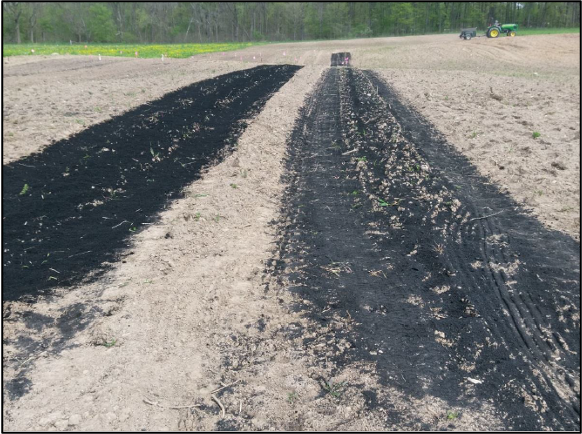Biochar: An emerging soil amendment
Proper use of biochar can improve soil fertility and health.

Soil health and fertility are tie-barred with farm profitability. There are many practices that have been proven to increase soil health and fertility such as manure application, cover crops, and no-till. However, biochar, an emerging soil amendment, shows promise in improving soil health and fertility. According to researchers Glaser, Haumaier, Guggenberger, and Zech, biochar is gaining attention as a sustainable product that may help decrease the need for fertilizers while also helping to reduce carbon emissions. Information for an upcoming webinar that discusses these benefits further can be found at the end of this article.
Biochar looks like charcoal. Lehmann and Joseph define biochar as biomass (wood, corn husks, poultry manure, etc.) heated at high temperatures in closed containers with little to no oxygen. Typically, biochar is very porous, has a high pH and carbon content, and has a much slower decomposition rate than the original biomass. All of these characteristics contribute to its potential to improve soil health.
Jessica Miesel, an assistant professor at Michigan State University (MSU), researches how various biochar brands and application rates affect soil health and fertility and soil carbon cycling. Similar to other research, Miesel’s experiments have shown that when mixed into soils, biochar can increase soil moisture and pH. By increasing pH, biochar can cause a liming effect. Evidence shows this can improve soil fertility by increasing microbial activity, nutrient availability, and reducing aluminum (Al3+) toxicity. While biochar is not a fertilizer, research indicates it can help retain nutrients in the soil due its charged surface and high surface area (from its porous structure, Figure 1) which allow it to adsorb nutrients like nitrogen, phosphorus, and carbon. Actually, some scientists have even found that when biochar is used in combination with compost it can retain the nutrients provided by the compost and can help decrease the need for commercial fertilizers.
By increasing soil pH, moisture content, and nutrient retention, biochar can also increase crop yield. While the results of biochar on yield are not conclusive yet, a scientific study summarizing 16 experiments found that biochar, on average, increases crop yield by 10%. Additional information regarding yield can be found in this Michigan State University Extension article.

Not all soils are well suited for biochar. For example, research in Miesel’s lab is currently examining how well-drained sandy soils experience biochar benefits such as increased soil moisture retention, but moderately well-drained and/or clayey soils may not always respond as positively. Additionally, Miesel advises before applying biochar to your fields, it is important to consider how the biochar was produced as well as the conditions of your soil.
Biochar has high potential as a sustainable product for increasing soil health and fertility in agricultural soils. Biochar’s production and its effects on soils can reduce the need for commercial fertilizers. Keep in mind when using biochar that some crop production practices and soil types may lead to different results. Current research at MSU is helping find the answers to many questions that remain (Figure 2).
To learn more about how biochar may benefit soils and the latest biochar research at MSU, you are invited to participate in a webinar given by Chase O’Neil on Tuesday, June 30, from noon to 1 p.m. To register go to https://msu.zoom.us/webinar/register/WN_KGF6mw-aTauZc8Yawb8udg. Chase is a master’s student in Jessica Miesel’s research group in the plant, soil and microbial sciences department at MSU.
For additional information about biochar use in cropping systems, visit https://www.canr.msu.edu/news/the_biochar_boon and the International Biochar Initiative.



 Print
Print Email
Email